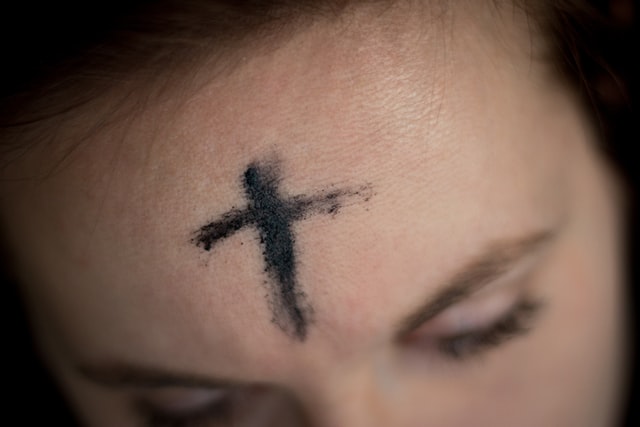
While the first mention of Lent traces back to the Council of Nicea in 325 AD, Ash Wednesday is only about 1000 years old. And this holiday didn't really take off in the United States until the 1970s. The Ash Wednesday service isn't mandatory, but it's one of the most attended services of the liturgical year.
But why use an ash cross? It may come from these two Bible Verses:
- "Remember you are dust, and to dust you shall return." - Genesis 3:19
- "So I turned my attention to the Lord God to seek Him by prayer and petition, with fasting, sackcloth, and ashes." - Daniel 9:3
Of course, most of the imagery, including the cross, is directly linked to Christ.
Sunday school teaches that the ash cross represents penance. But it's more than that if you think about it. Jesus Christ sacrificed himself for the sins of all humankind through the crucifixion. Yet, He overcomes death on Easter Sunday through the Resurrection.
The ash, smeared on our foreheads during Ash Wednesday, is both a reminder of our beautiful but brief lives on earth and a reminder of our eternal life in Jesus Christ.
Understanding the Lenten Season
Like Ash Wednesday, Lent isn't explained in detail in the Bible, but its origin does stem from two famous Biblical stories.
After Jesus' baptism at Bethany Beyond the Jordan (less than an hour from our main office), Christ fasted for 40 days in the desert. Satan tried to tempt him into sin during this time but ultimately failed. At the end of that 40 day period, Jesus traveled to Galilee, where he began to spread the Good News.
The second story deals with Easter – the reason for the season. Lent officially ends on Maundy Thursday, which commemorates the Last Supper. The day after, Christians attend mass on Good Friday and perform the Stations of the Cross to reflect on Christ's sacrifice during the Crucifixion. But that following Sunday is a time for joy and good tidings as millions of believers around the world celebrate Christ's triumph in the Resurrection.
That said, as important as Lent is to our spiritual lives, it often sneaks up on us. That's because the dates change from year to year. The differences between Western and Eastern churches also factor into differing dates for Lent and Easter. But here are the key dates before and after Lent to keep track of.
Important Dates for Lent

- Shrove Tuesday - Also celebrated as Fat Tuesday or Mardi Gras, this is the day before Ash Wednesday. Pancakes, eggs, and dairy are the most popular dishes, but they aren't the only ones. Why breakfast food? Well, it has less to do with breakfast and more to do with high carbs and high proteins, since during Lent, many Christians choose to fast.
- Ash Wednesday - Lent officially begins on Ash Wednesday. During this time, Christians attend services or mass, receive holy communion, and the priest smears an ashen cross on their forehead. Holy Week - The final week of Lent is dubbed Holy Week, and it includes Palm Sunday, Holy Wednesday, Maundy Thursday, Good Friday, and Easter Sunday.
- Palm Sunday - To kick off Holy Week, Palm Sunday remembers Jesus' entrance into Jerusalem just prior to the crucifixion. Many Christian churches burn palms to remember this event and use the ashes for the next year's Ash Wednesday.
- Holy Wednesday - While a lesser-known holiday, Holy Wednesday remembers Judas' betrayal of Jesus.
- Maundy Thursday - As the last day of Lent, Maundy or Holy Thursday celebrates the Last Supper.
- Good Friday - On this day, Christians worldwide remember the passion and sacrifice of Jesus Christ. Every church celebrates this day a bit differently. Other than a noon-day mass, Christians may choose to take part in the Stations of the Cross, watch passion plays, or pray the rosary.
- Holy Saturday - After the crucifixion, Christ descended into hell before rising again. His disciples, meanwhile, led a 40-hour vigil.
- Easter Sunday - Finally, on the day of the Resurrection, Christians attend mass once again before enjoying a feast with their families and loved ones.
Making the Most of the Lenten Season
We can talk about the origin of Lent, but what this 40 day period means for Christians today is less clear. Are we all wandering in our own deserts, looking to deny temptations and find repentance? What is understanding mortality when humans today easily survive and thrive at 80-years-old?
The Lenten Season provides a chance for all Christians to wander not alone but together.
Through daily reflections, good work, and at times self-denial, we build the spiritual discipline required to better understand Christ's sacrifice and become our better selves. Though the ashes smeared in the shape of a cross on our foreheads reminds us of the end, the imminent Easter Sunday gives us hope of eternal life.
But for many, especially those Christians who grew up celebrating Lent year after year, it's easy to wonder if we're still doing it "right." Is giving up chocolate or only eating fish on Fridays enough to really grow spiritually?
To shake things up and help you to make the most of the Lenten season, we've got six tips for a more spiritual Lent:
- Invest in good works When we think of Lent, we think of what we need to remove from our lives. What we need to give up. But being a Christian doesn't have to be about doing less – sometimes we need to do a bit more. Volunteering at an animal shelter, assisting your local youth ministry, or paying forward acts of kindness can build spiritual discipline just as much as shutting off the TV for six weeks. There are many ways to show stewardship and grow in the faith, you just need to find an activity that works with your schedule.
- Redefine fasting Most of us cut out the small things. Guilty pleasures such as chocolate, wine, or shopping. And all of those are great ways to improve our relationship with Jesus Christ. But it can also help to be more mindful about what items or actions we choose to discard. Are there attitudes or limiting self-beliefs we need to leave behind? What changes do we want to keep long after Lent has passed? Lenten discipline isn't just an act of self-denial, it's a period of inner transformation. After all, God doesn't "need" Lent – He is already perfect. Lent is a chance for us to get closer to God.
- Spend more time with loved ones Have you ever stopped and thought about how much time you spent with your loved ones? Dinner and Sunday services are a great start. But consider spending an extra ten minutes or half-hour with those you love on a regular basis. Jesus was alone in the desert, but we don't have to be. We have a global community to lean on through the Chrisitan Church.
- Shake up your prayer schedule Prayer, whether it's Grace before meals, daily reflections, or the rosary is less about penance and more about preparing ourselves for the glory of the Resurrection.
- Plan for your future Service, prayer, charity, and fasting are all essential Lenten reflections. But another way to remember the meaning of the season is to set time aside for legacy planning. No one wants to dwell on their own mortality, but the use of ashes reminds us that life on this earth is short. Providing a plan for your loved ones now can both be a period of reflection and help put the church's teachings into perspective.
- Keep a Lenten Calendar Let's face it, we all have busy schedules. Consider using a Lenten Calendar to easily set daily reflections or activities. There are dozens of free templates online, or you can make your own. If you have children or grandchildren, this can be a fun family activity to celebrate Lent together.
Preparing for Easter

The Lenten Season, from Ash Wednesday to Good Friday, is about preparing our souls for the Resurrection of Jesus Christ and celebrating the glory of God. When these 40-days of fasting are finally over, Christians worldwide celebrate not through ashes but through eggs – the symbol of renewal and new life.
And, of course, it's common to go out for a delicious Easter brunch and feast with family. New baptisms also take place, typically during or around Easter Mass, making the holiday even more memorable.
Christian and faith-based gifts can represent so much to those you love. And the popularity of jewelry as a gift in the Bible has extended to Easter and Baptism gifts. If you want to give your friends or loved ones a long-lasting reminder of their faith and spiritual reflection during this season, consider checking out our hand-made collection from The Holy Land.






